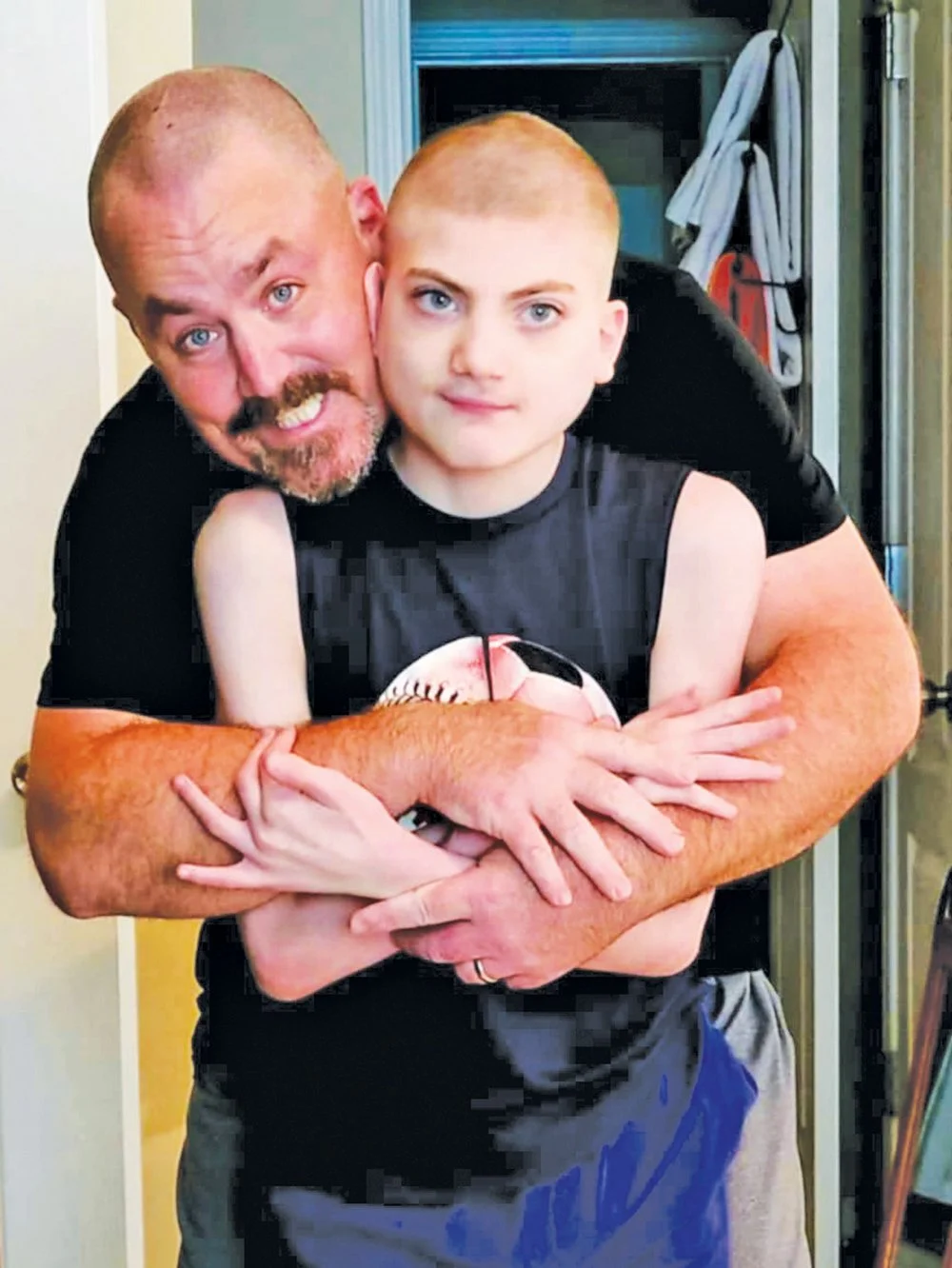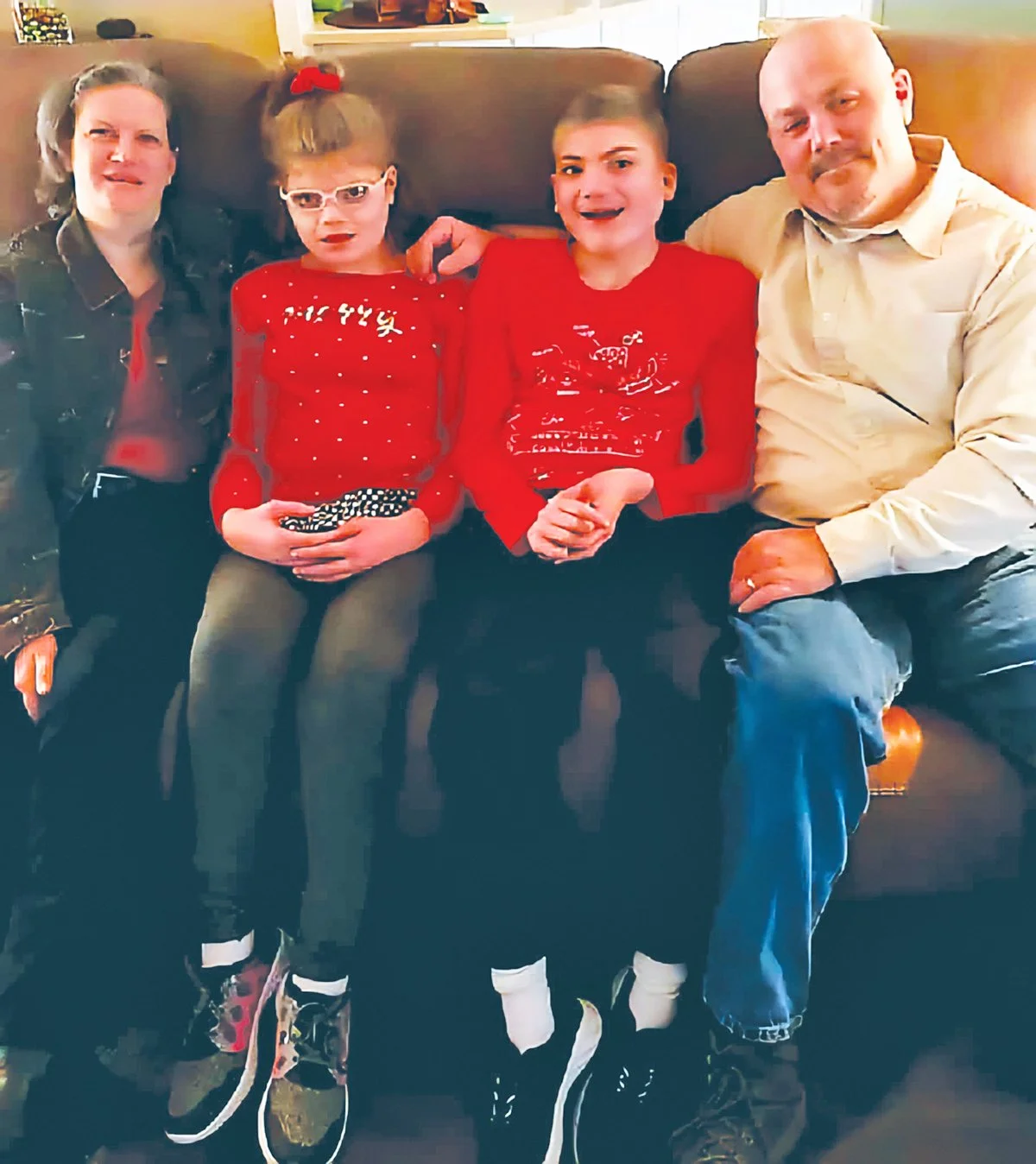Enduring Love and a Legacy after Loss
Written by JENNIFER LONDON
Photographs courtesy of JASON TUTTLE
Jason Tuttle’s strong love for his son Zachary is defined in this photo.
“There is a sacredness in tears. They are not the mark of weakness, but of power. They speak more eloquently than ten thousand tongues. They are the messengers of overwhelming grief, of deep contrition, and of unspeakable love.”
Newnan residents Jason Tuttle and wife Jennifer married in 2003 and soon started their family, first having son Zachary and then daughter Samantha.
Jason and Jennifer Tuttle relax at home with their children‚ Samantha and Zachary.
Both children were born with special needs, but firstborn Zachary was diagnosed with Eagle Barrett Syndrome, also known as Prune Belly Syndrome, a rare congenital malformation resulting in the absence of abdominal muscles, causing the skin to wrinkle up like a prune. He was born with one kidney, had severe delays and epilepsy, and was nonverbal and wheelchair bound.
Zachary was in and out of the hospital throughout his life and extremely susceptible to respiratory illnesses, according to his father. He had several major surgeries with long recovery times, including a spinal fusion surgery in 2021. Despite the challenges his son faced, “he was always laid back, he was always happy and smiling, even in the midst of being in the hospital,” says Jason.
Zachary had a big personality.
“He was very personable, even though he couldn’t talk he certainly talked with his eyes,” says his father. “He never met a stranger. He loved everybody.”
Zachary enjoyed music, watching sports with his dad, and participating in Special Olympics bowling and hippotherapy.
About six months after his last surgery, teenaged Zachary came down with a sudden illness. As it progressed into more serious symptoms, Zachary was taken to Scottish Rite Hospital where he died.
“The official cause of death was sepsis and cardiac arrest due to sepsis,” says Jason. “He got an infection somewhere, and it got into his bloodstream.”
Zachary died on January 28 in 2022. He was 15.
“That whole scenario is what started everything I’ve done with ‘Letters to Zachary,’” says Jason. “I’ve always been a huge proponent of counseling and therapy. I had seen a counselor for some issues I was dealing with.”
Jason Tuttle and son Zachary share summertime smiles.
A letter to Zachary from his father, Jason
June 26, 2025. In this moment, my heart hurts for you to be here. My eyes long to see your face. My arms wish to feel your embrace. My ears want your laughter to break the deadening silence. I long for that which is in the past. I question the reasoning why life had you on the path you were and why life makes me endure after you are gone. I know that life is not fair, but I still question why it can’t be fair. I ask questions that I know I will never get answers to. I long for justification in an unjust world. I just want what was mine … back. Sadly, I know that’s not how it works.
So, I sit here. Quietly sorrowful as if to not wake anyone else up this morning. Tears running down my face. Sadness enveloping me. Feeling the despair of never again – all while hoping that I can somehow change what is now cemented in time.
Damn. I miss you, Zachary.
After his son died, he went back to therapy for help in processing his grief.
“I just got through dealing with some anger issues and that kind of thing, and now my son has passed away and I feel like it’s just all flooding back,” he recalls.
One day his counselor asked him if he ever considered journaling. She encouraged him to put it on the backburner as a mindfulness activity, reminding him that he didn’t have to share it with anybody, that he could write it out, burn it or delete it off his computer.
“It sat on the mental side table for nine months,” says Jason.
Then one day, while on Facebook, he saw a video that triggered memories of Zachary, and he became inconsolable. After getting through the moment, Jason decided to try his hand at journaling, turning on some music and turning to a Word document to get out everything he’d been holding in.
“If I feel like I need to drop an F-bomb in the moment because that’s how I’m feeling, that’s how I’m gonna write it,” he told himself. “I’m not gonna sugarcoat it.”
He journaled several times a day for weeks, Jason recalls; he stored the writing in a folder on his computer. Eventually, he came across a Facebook group for parents who had lost a special needs child. He joined the group and noticed there were few male members; he asked the site administrator if he could post some of his journal entries and was given the go-ahead.
Summoning the courage to post one of his letters to his son, Jason said he was in a mental state that he thought might lead him to jump down someone’s throat if they disagreed with him. He posted anyway and was shocked at the influx of positive responses from group members. Continuing to post with the hope of helping other people, the inevitable healing for Tuttle began to take shape. A year into it, his wife Jennifer noticed the positive shift, according to Jason.
“Letters to Zachary” started as a Facebook page and expanded with Instagram and TikTok as well as a professional website, letterstozachary.com, and a “Letters to Zachary” coloring book. Jason also found success in the world of podcasts on the Sunsetstories podcast run by a mother who lost two children to death.
“Hers was the first podcast I did,” Jason recalls. “She was willing to give me a chance to do an episode to be able to share my story, and that’s kind of how it started.”
He has done close to 100 podcasts now, including four live episodes and two internet-based TV shows. His followers consist mostly of women, and he hopes to reach more men, encouraging them to open up about their grief. He emphasizes that whatever is shared with him stays confidential.
“Initially, I did it specifically for men,” says Jason of the “Letters to Zachary” Facebook site, which is subtitled: “A Grieving Father’s Raw Journey.”
“All I was looking for was men who I could bounce ideas off of,” he says. “There are certain things men deal with that maybe women don’t.”
Jason admits losing his son to death has changed him irreversibly.
“Like anybody in the grief world, I still have my moments,” he says. “I tell people all the time: If you’re looking for me to be who I was before my son passed, you can forget that. It’s a big change when you lose someone in your life.”
From his personal perspective, this is how Jason Tuttle puts it: “You’ve got to understand that grief sucks. With that being said, it’s difficult, but you will eventually, in a sense, get through it. You won’t be able to see it maybe that first month, six months, maybe a year, but you’ll eventually start, as we say, moving forward with the grief. Don’t let people tell you that how you’re grieving is wrong. There’s a lot of nuances to all of our grief and what we’re dealing with that other people don’t know.”
For more, visit letterstozachary.com. NCM



